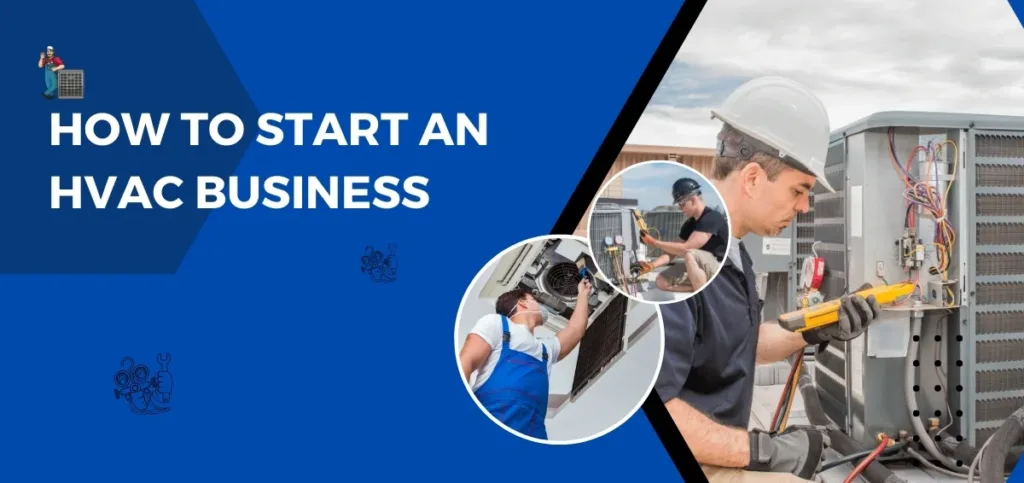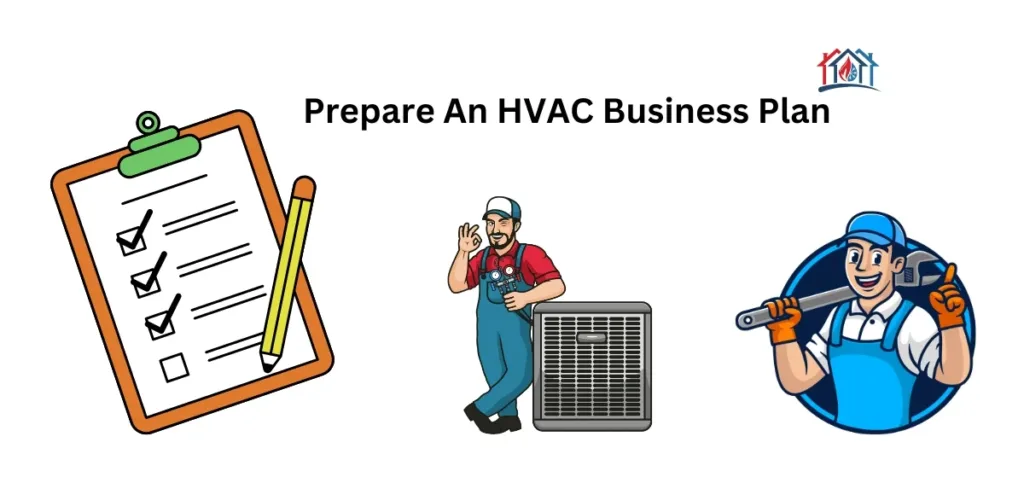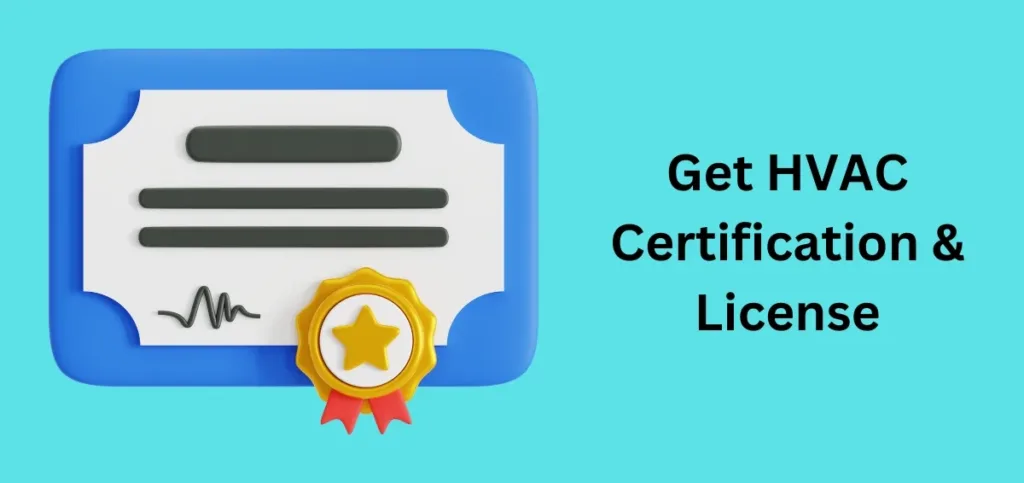
HVAC is one of those markets that is expected to reach $228.7 billion by 2030! If you are a skilled HVAC technician wanting to start your own business, it may feel arduous at first. But with a strong plan and the right guidance, achieving success is not impossible. To simplify the process, here’s a detailed overview of how to start an HVAC business. Right from creating a carefully crafted business plan to marketing your venture, we’ve covered it all.
1. Prepare An HVAC Business Plan

Creating an HVAC business plan will help you set realistic goals and expectations. You will also become clearer about what you need to achieve for a successful operation.
- Start with an executive summary outlining what your business does, its owner, the number of employees, and its location. It also includes funding needs and financial projections of your business.
- Now, define your business’s purpose, target customers, and how you are different from your competitors.
- Deeply research your market to find out how to compete with others. This may mean addressing an unmet need or providing better services.
- Outline your business’s legal structure, including whether you are in a partnership, a sole proprietorship, a corporation, or an LLC.
- Describe the kind of services or products you sell. Also, outline how your offerings help your customers.
- Now, explain your marketing strategy. This is a very dynamic area and will change according to the dynamic customer requirements.
- The next section will outline the funds you need to adequately operate your HVAC business for at least the next five years. You must clearly define how you will use the money and whether you need equity or debt funding.
- Last but not least is your financial projection for the coming years when your business is in operation.
- Give an estimate of the income and cash flow statements, balance sheets, and capital expenditure budgets.
- Finally, include an appendix section with things like product pictures, resumes, credit histories, legal documents, licenses, patents, and letters of reference.
Read Also: How To Open a Convenience Store
2. Secure Funding For Your HVAC Startup

Did you know that this business’s startup costs can reach as much as $10,000? Here are some effective and non-conventional ways to secure funding.
- Take personal loans from family or friends: These offer several advantages, such as no or low-interest rates and flexible repayment terms. However, ensure that you lay out a clear repayment schedule and make payments on time.
- Pitch your company to angel investors: Angel investors are wealthy people who enhance business capital through private funds in return for equity. They offer small cash amounts for longer periods with a certain return on investment. If you feel that you have a successful strategy, pitch your business to them.
- Get business grants: Check out the government grants site to get additional funds. Depending on your industry-specific activities, you may be eligible for some grants.
- Reach out to venture capitalists (VCs): VCs can provide funding for a stake in your company. If you are having trouble expanding your business, approaching them can help. VCs generally ask for your financial statement to decide whether to support you with funding.
3. Get HVAC Certification & License

An HVAC certification establishes your skill in the fundamentals of heating and refrigeration or in other related HVAC topics. Many US states need you to get this certification if you want to begin your business. You can get certified through organizations such as the Environmental Protection Agency (EPA), ESCO Group, and North American Technical Excellence (NATE). To get this certification, you must have a high school diploma wherein you studied subjects like mathematics and physics. Next, learn the trade by participating in and completing an accredited HVAC program. After that, find an apprenticeship program from local associations like Associated Builders and Contractors and Air Conditioning Contractors of America. Finally, get hands-on training by working under an HVAC contractor.
To run your HVAC business, you need an HVAC contractor license. It mandates you to maintain a permanent location of business and register with your Secretary of State. Through it, you also carry liability insurance and provide workers’ compensation. The procedure for obtaining an HVAC license varies in different US states. For example, to work as an HVAC technician in Alabama, you should get a license from the Alabama Board of Heating, Air Conditioning & Refrigeration Contractors. In Arizona, HVACR contractor licenses are issued via the Arizona Registrar of Contractors (ROC). In California, obtaining a license from the Contractors State License Board typically entails passing an HVAC contractor licensing exam and demonstrating requisite years of experience under a professionally licensed contractor.
4. Get The Right Tools

Of course, you need basic, specialty, and technical tools to run your HVAC business. But to run a successful one, you need much more than that.
Basic Tools
A basic tool kit includes pipe wrenches, electric drills, screwdrivers, hammers, and other items that are also found in regular households.
Technical Tools
HVAC-related servicing work requires you to possess several technical tools. These include:
- A carbon monoxide detector to ascertain this odorless gas.
- A recovery unit to eliminate refrigerants from Acs.
- A heat-sensitive thermal image camera to detect problematic areas in a cooling device.
- A refrigerant storage tank to hold refrigerant recovered from cooling systems.
- A vacuum pump to suck out the vapor inside the unit under operation.
- A refrigeration gauge to examine the pressure of liquids and gases inside an HVAC system.
HVAC Specialty Tools
If you have a team of technicians with advanced and specialized knowledge, you need sophisticated equipment to improve your service quality. These include:
- Digital refrigerant gauges: This tool is for getting the live instant readings of subcooling and superheating.
- Multimeter: It is a voltage tester to fix electronic parts of a system.
- HVAC air filter puller and pusher tool: It helps you conveniently replace filters in the biggest systems. It makes it easy to retrieve dropped hardware from the site location.
- Leak detector: Refrigerant leak detectors are to locate areas with moisture. Thus, you can effectively identify the site of the refrigerant leak.
- Nitrogen regulator: This tool lowers the high pressure of a gas cylinder so that it can be dispensed properly. It can also be used to service various secondary regulators downstream or in a single-pressure, single-keg application.
Tools to Boost Revenue
As a modern HVAC business, you must leverage digital business tools to not only run your operations smoothly but also increase revenue. Consider investing in the following as per your specific needs:
- Payment software: To make electronic payments seamless, consider integrating payment software with your existing IT infrastructure.
- Field service management software: This is valuable software that helps you with scheduling appointments, monitoring the location of your technicians, and generating invoices.
- Accounting software: Good accounting software helps you handle things like payments, salaries, and bookkeeping. It immensely helps increase the productivity of your business.
Read Also: Why is Foresight Not Getting Traction with Business?
5. Market Your HVAC Startup

HVAC marketing plays a huge role in your success in the face of growing competition in this industry. You can market online and offline. However, you should have a definite marketing plan before launching your campaign. Here are some tips to consider.
- Pinpoint HVAC advertising sources. You can use offline sources, such as postcards, direct mail, and printed media, or online sources, such as SEO, social media marketing, email marketing, and the like. Research your target market to determine which sources yield the best possible return.
- Tailor your marketing efforts based on the industry’s nature. For example, advertising for heating in summer won’t give you the results you are looking for. So, consider the seasonality aspect of your marketing campaign.
- Create a captivating HVAC website. It should offer value and entice the visitor to take action. Designing the website to evoke a sense of FOMO (fear of missing out) while offering incentives like a free monthly subscription will help you hook a majority of your target customer base. At the same time, improve your website’s visibility on search engines by working on its SEO (search engine optimization). If you want to gain visibility quickly, you can hire an SEO agency.
- Get people to review your services. Ensure that you register on review websites to invite and respond to customer reviews. Motivate more people to provide feedback on your services through bonuses. For example, offer a discount on a specific service in return for a review. Once you have a decent number of reviews, showcase them on your business website to boost its credibility.
- Google My Business (GMB) is a great tool for HVAC businesses wanting to market their services to local customers. GMB will give your HVAC business an exact location on Google Maps, Google’s Local Pack, and Local Finder. Thus, potential local clients will be able to discover your services faster.
- Google Local Service ads help your business attract more leads. These ads appear at the beginning of the search results and display critical information about your business, like its name, star rating on Google, phone number, operating hours, and a short blurb. Customers can look at this information and determine if your services fit their needs.
Wrapping Up
Opening an HVAC business and how to start an HVAC business requires careful planning, securing funding, getting certifications, and the right equipment. Marketing is another area which needs much of your attention. The steps mentioned in this blog will help you establish and run a successful HVAC business. With the industry estimated to reach substantial growth in the coming decade, proper execution is key to thriving in the market.










